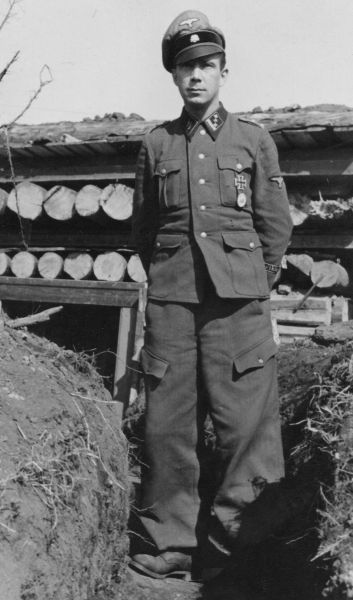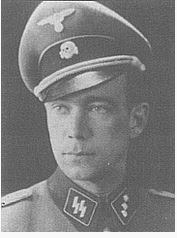Frühauf, Carl-Heinz (Waffen SS)
- Date of birth:
- February 14th, 1914 (Hamburg, Germany)
- Date of death:
- April 18th, 1976 (Buchholz-Hamburg, Germany)
- Service number:
- SS-Nr.: 61.349 // NSDAP-Nr.:
- Nationality:
- German
Biography
Promotions:
00.00.1939: SS-Untersturmführer der Reserve
00.00.1940: SS-Obersturmführer der Reserve
09.11.1942: SS-Hauptsturmführer der Reserve
09.11.1944: SS-Sturmbannführer der Reserve
00.00.1945: SS-Obersturmbannführer der Reserve
Career:
00.00.1944: SS-Hstuf, Chef, 5. Kompanie, II. Bataillon, SS-Freiwilligen-Panzer-Grenadier-Regiment 49 ‘De Ruyter’, 4. SS-Freiwilligen-Panzer-Grenadier-Brigade ‘Nederland’
30.03.1944: SS-Stubaf, Kdr., II. Bataillon, SS-Panzergrenadier-Regiment 49 ‘De Ruyter’, 4. SS-Freiwilligen-Panzergrenadier-Brigade "Nederland"
00.03.1945: Kdr., SS-Aufklärungs- Ausbildungs und Ersatz-Abteilung I, SS-Panzer-Aufklärer-Regiment ‘Meyer’, SS-Panzer-Brigade ‘Westfalen’
Do you have more information about this person? Inform us!
- Period:
- Second World War (1939-1945)
- Awarded on:
- November 10th, 1939
- Period:
- Second World War (1939-1945)
- Period:
- Second World War (1939-1945)
- Awarded on:
- September 20th, 1941
- Period:
- Second World War (1939-1945)
- Period:
- Second World War (1939-1945)
- Rank:
- SS-Hauptsturmführer der Reserve (Captain of Reserves)
- Unit:
- Führer, II. Bataillon, SS-Freiwilligen-Panzergrenadier-Regiment 49 "De Ruiter", 23. SS-Freiwilligen-Panzergrenadier-Division "Nederland" (niederl. Nr. 1), Waffen-SS
- Awarded on:
- June 4th, 1944
“On the 22.03.1944, following a significant fire concentration, the enemy penetrated into the sector of the 5./SS-Freiw.Pz.Gren.Rgt. 49 ‘De Ruyter’. At the first sign of the enemy attack the commander of the II./SS-Freiw.Pz.Gren.Rgt. 49 ‘De Ruyter’, SS-Hauptsturmführer Frühauf, went to the command post of 5. Kompanie. Here he encountered the fleeing remnants of 5. Kompanie. The enemy had broken into the positions of the Bataillon with 150 men and was continuing their advance towards the edge of Narwa itself. The remnants of 5. Kompanie had been battered by the preceding drumfire and the heavy casualties sustained, and reserves were no longer available.
Although it would definitely be possible to defend the 5. Kompanie’s command post as a strongpoint and wait until the arrival of the divisional reserve (located behind this sector), SS-Hauptsturmführer Frühauf made the decision to commence a counterthrust with his available forces. He gathered up the remnants of the 5. Kompanie along with messengers and communications personnel, and with these he stormed against the broken-in enemy. The counterthrust threatened to stall against the far numerically superior enemy several times, but on each occasion SS-Hauptsturmführer Frühauf was able to renew the spirit of his soldiers through his personal example. As a result of his personal bravery the old position was recaptured following a half hour of close combat.
During the sustained combat that lasted through the whole afternoon of the 22.03.1944, SS-Hauptsturmführer Frühauf remained as the soul of the resistance. He organized the defense of the hotspots of the fighting from the foremost trenches, all while under the strongest enemy fire.
His personal decision to commence a counterattack with the assembled elements of his Bataillon as well as his personal bravery (which enabled the counterthrust to succeed) were of decisive importance for holding the front of the Narwa bridgehead.”
Sources
- Photo 1: Paul Turner
- - FELLGIEBEL, W.P., Elite of theThird Reich, Helion & Company Limited, Solihull, 2003.
- WEGMANN, GÜNTER, Die Ritterkreuzträger der Deutschen Wehrmacht 1939-1945, Biblio Verlag, Osnabrück, 2010.
- Die Ordensträger der Deutschen Wehrmacht (CD), VMD-Verlag GmbH, Osnabrück, 2002
- Microfilm Publication A3343. US National Archives








